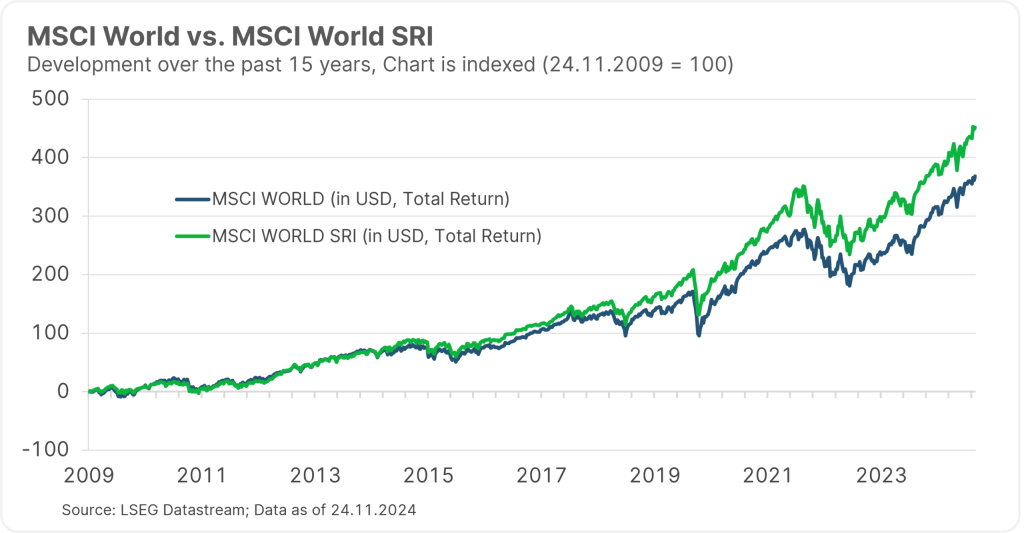It is undeniable that the protection of our planet has also arrived in the financial industry and is a high priority. Nevertheless, the initial interest in ESG products in the financial world has waned and is often seen as a passing trend. In this case, ESG stands for Environmental, Social and Governance and is an umbrella term for sustainable investments.
In recent years, rising interest rates had reduced the attractiveness of ESG investments, as they often involve capital-intensive sectors such as clean energy, which are heavily dependent on financing costs. In some countries, particularly the US, there has been political resistance to ESG investing. This has led to increased skepticism and regulatory challenges. There have been increasing concerns about the transparency and credibility of ESG ratings. Many investors have become more cautious, fearing that some companies are exaggerating their sustainability efforts
However, the interest rate landscape has changed and ESG plays an important role at the risk management level and in the selection of individual securities and funds. This is because ESG criteria can help identify and manage long-term risks that might otherwise be overlooked. Companies that integrate ESG practices are often better prepared for regulatory changes and can benefit from a positive public image.
New transparency from 2025
From 2025, companies that are already subject to the CSR Directive will be obliged to report in accordance with the new requirements of the Corporate Sustainability Reporting Directive (CSRD) for the first time for the 2024 financial year. This requirement applies to companies that meet two of the following criteria: more than 250 employees, a turnover of more than 40 million euros or a balance sheet total of more than 20 million euros in two consecutive financial years.
The CSRD will have a significant impact on the ESG landscape. It aims to encourage companies to put sustainability at the heart of their business strategies and to take full account of their impact on the environment and society. This will not only improve the transparency and comparability of sustainability reports, but also encourage companies to develop long-term and sustainable business practices.
Companies must report on environmental, social and governance issues
These new requirements are intended to improve the quality and consistency of ESG reporting, making it easier for investors and other stakeholders to assess the sustainability performance of companies and make informed decisions. Investors and consumers will also be able to better compare the ESG performance of different companies.
The CSRD not only affects large capital market-oriented companies, but also many non-capital market-oriented large companies and groups within the EU. Non-EU companies with subsidiaries or branches in the EU single market will also be required to report by 2028. Companies must publish their sustainability reports as part of the management report, which is audited together with the annual financial statements. This increases the reliability and relevance of the reports. Even though the directive is a central component of the European Green Deal, which aims to make Europe climate-neutral by 2050, it not only promotes environmental aspects, but also places great emphasis on social and governance issues. This includes aspects such as employee satisfaction, training and further education as well as good corporate governance. The reports must be audited by an auditor, which ensures the credibility and accuracy of the information.
The supply chains receive additional attention
The new EU Supply Chain Directive, also known as the Corporate Sustainability Due Diligence Directive (CSDDD), was adopted by the permanent representatives of the EU member states in March 2024 after lengthy negotiations, and the member states now have two years (until July 26, 2026) to transpose the directive into national law.
The new EU Supply Chain Directive requires companies to identify and assess human rights and environmental risks throughout their entire value chain. This includes both direct and indirect business partners. Companies are obliged to take measures to prevent or minimize identified risks. They must regularly report on their due diligence obligations and the measures taken. These reports should be transparent and publicly accessible. Sustainability and human rights aspects must be integrated into the company’s business strategy.
Some prominent examples illustrate the need for this directive: in 2018, H&M was criticized because some of its suppliers in Asia produced under poor working conditions and did not comply with environmental standards. Another example is Apple, which hit the headlines in 2010 and 2012 because of the working conditions at its suppliers in China, particularly Foxconn. These cases show how important it is for companies to carefully monitor their supply chains and ensure that they comply with ESG standards.
Relatively positive return on ESG investment increasingly clear
The statistics on ESG indices show that the integration of sustainable aspects and criteria leads to long-term financial returns that are (at least) comparable to those of indices without ESG. However, the results vary depending on the time horizon, index and region. For example, 2022 was a difficult year for most ESG/SRI indices (Socially Responsible Investments).
However, according to a 2018 analysis by BofA Merrill Lynch, companies with high ESG ratings are less susceptible to systemic market risks and have lower earnings volatility. Over the past 15 years, for example, the MSCI World SRI has outperformed the MSCI World. Both indices represent the global equity market in developed countries, while the MSCI World SRI focuses on companies with good ESG ratings in its index composition and excludes companies whose products have a negative environmental or social impact. However, it should be noted that investments in securities always involve risks as well as opportunities.
Note: Past performance is not a reliable indicator of future performance.

Conclusion
The consideration of ESG criteria (Environmental, Social, and Governance) is of crucial importance for share valuations, as it encompasses a large number of influencing factors.
Investor interest is another aspect that is relevant in the context of ESG criteria. The consideration of sustainability criteria is becoming increasingly important for investors, as this can reduce risks for companies and thus increase their value in the long term. ESG investments are generally regarded as more sustainable and less volatile.
Companies with strong ESG practices often have a better public image and higher customer loyalty. This can lead to a competitive advantage and increase brand value.
Companies with high ESG ratings usually have a better financial performance. This can be attributed to the fact that they operate more efficiently, have fewer legal problems and are better prepared for future challenges.
ESG is therefore a key element in the valuation of equities, as it not only contributes to risk mitigation, but also offers the potential for long-term value appreciation.
You can find more information on our sustainable investment approach and funds that take sustainable criteria into account at Responsible investing.
Legal disclaimer
This document is an advertisement. Unless indicated otherwise, source: Erste Asset Management GmbH. The language of communication of the sales offices is German and the languages of communication of the Management Company also include English.
The prospectus for UCITS funds (including any amendments) is prepared and published in accordance with the provisions of the InvFG 2011 as amended. Information for Investors pursuant to § 21 AIFMG is prepared for the alternative investment funds (AIF) administered by Erste Asset Management GmbH pursuant to the provisions of the AIFMG in conjunction with the InvFG 2011.
The currently valid versions of the prospectus, the Information for Investors pursuant to § 21 AIFMG, and the key information document can be found on the website www.erste-am.com under “Mandatory publications” and can be obtained free of charge by interested investors at the offices of the Management Company and at the offices of the depositary bank. The exact date of the most recent publication of the prospectus, the languages in which the fund prospectus or the Information for Investors pursuant to Art 21 AIFMG and the key information document are available, and any other locations where the documents can be obtained are indicated on the website www.erste-am.com. A summary of the investor rights is available in German and English on the website www.erste-am.com/investor-rights and can also be obtained from the Management Company.
The Management Company can decide to suspend the provisions it has taken for the sale of unit certificates in other countries in accordance with the regulatory requirements.
Note: You are about to purchase a product that may be difficult to understand. We recommend that you read the indicated fund documents before making an investment decision. In addition to the locations listed above, you can obtain these documents free of charge at the offices of the referring Sparkassen bank and the offices of Erste Bank der oesterreichischen Sparkassen AG. You can also access these documents electronically at www.erste-am.com.
Our analyses and conclusions are general in nature and do not take into account the individual characteristics of our investors in terms of earnings, taxation, experience and knowledge, investment objective, financial position, capacity for loss, and risk tolerance. Past performance is not a reliable indicator of the future performance of a fund.
Please note: Investments in securities entail risks in addition to the opportunities presented here. The value of units and their earnings can rise and fall. Changes in exchange rates can also have a positive or negative effect on the value of an investment. For this reason, you may receive less than your originally invested amount when you redeem your units. Persons who are interested in purchasing units in investment funds are advised to read the current fund prospectus(es) and the Information for Investors pursuant to § 21 AIFMG, especially the risk notices they contain, before making an investment decision. If the fund currency is different than the investor’s home currency, changes in the relevant exchange rate can positively or negatively influence the value of the investment and the amount of the costs associated with the fund in the home currency.
We are not permitted to directly or indirectly offer, sell, transfer, or deliver this financial product to natural or legal persons whose place of residence or domicile is located in a country where this is legally prohibited. In this case, we may not provide any product information, either.
Please consult the corresponding information in the fund prospectus and the Information for Investors pursuant to § 21 AIFMG for restrictions on the sale of the fund to American or Russian citizens.
It is expressly noted that this communication does not provide any investment recommendations, but only expresses our current market assessment. Thus, this communication is not a substitute for investment advice.
This document does not represent a sales activity of the Management Company and therefore may not be construed as an offer for the purchase or sale of financial or investment instruments.
Erste Asset Management GmbH is affiliated with the Erste Bank and austrian Sparkassen banks.
Please also read the “Information about us and our securities services” published by your bank.

